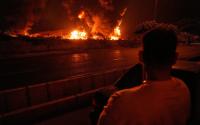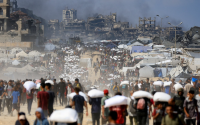20 June 2006John Simpson
 Women and children died in the attack in Haditha |
The lawyer for one of the marines accused of the massacre has told the BBC that criminal charges will probably be brought soon.
And we have found that the marines were operating under some very disturbing conditions.
The accusation is that after a US marine lance corporal died in a roadside bombing in Haditha last November, his fellow marines went on a killing spree.
Twenty-four people died in the attack, including seven women and three children.
A 12-year-old girl who survived says the Americans killed them indiscriminately.
The marines said they had came under fire from the houses where the people died.
The lawyer representing one marine told us he believed they would face charges, but said they were following their rules of engagement.
"I don't think the facts will show they intentionally killed those civilians," Paul Hackett said. "It was in the heat of battle, in the heat of clearing the houses.
"That is, like it or not, that is what those marines are required to do. They are required to close with the enemy, and kill the enemy."
'Feral' conditions
But Haditha is not the only massacre that has been alleged against the US forces.
A US inquiry has cleared them of blame for the deaths of civilians in Ishaqi in March - yet leading figures in the Iraqi government are unhappy, and want a wider investigation.
 Members of Kilo Company were operating in deteriorating conditions |
But what happened at Haditha seems more clear-cut.
It is an intensely dangerous place for the Americans, and the battle-weary men of Kilo Company - the unit which included the marines accused of the massacre - had lost a lot of men there.
And they were operating under disturbing circumstances.
Kilo Company's headquarters were three miles north of Haditha, at a vast dam across the Euphrates. It is a big target, because it supplies power to much of southern Iraq.
Four hundred men of the First Marine regiment were based in this decaying rabbit-warren. Conditions were so disgusting, many just moved out.
They set up these unofficial shacks alongside it. Conditions at the dam have been described as "feral".
Oliver Poole is one of the few reporters to have been there, shortly after the alleged massacre. He was shocked by these strange, primitive huts, which lacked even basic hygiene.
"You walked in and the first words were 'F off', and they were ripping pieces of wood apart to feed the fire," he said. "You could see the conditions in which they lived. And they were filthy. It was disgusting."
There seemed to him to be no real discipline.
"The fact that the officers had let conditions deteriorate to the level in which where people living in such basic environment, that says something," he said. "Where were the officers keeping the standards that the US military keeps in the field?"
Blame game
The marines of Kilo Company are now back at Camp Pendleton, in California. But that question of keeping the men under proper control is essential.
 The investigation into the alleged massacre is still ongoing |
"The hardest thing is not necessarily killing someone or shooting someone; it's not killing someone or shooting someone when you're angry," said Paul Rieckhoff of the Iraqi Veterans Campaign.
"When someone in your unit is killed or wounded it's like someone attacked your family. The responsibility then is on one of the squad leaders, platoon leaders, team leaders to hold those guys back."
Up to now in the US, those against the war have blamed the people at the very top for what is happening in Iraq.
But the news that three American soldiers have been charged in connection with the deaths of three prisoners in Iraq last month - and the probable charges over Haditha - may mean that Americans will now start blaming those who are actually fighting the war as well.
Just as they did in Vietnam.






